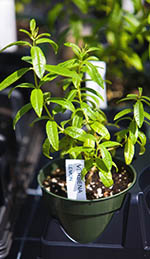 There’s nothing quite like the study of essential oils to make one realize the deep relationship between the chemistry of plants and their outward characteristics, including their distinctive smell, taste, and therapeutic effects. Verbena essential oil is a case in point: because it contains high levels of citral [3], verbena oil has an unmistakable lemony fresh smell usually associated with lemons and other citrus fruits! Hence, verbena is often called lemon verbena, and in the Latin name for the plant (Lippia citriodora), “citriodora” actually means “lemon-scented” [1].
There’s nothing quite like the study of essential oils to make one realize the deep relationship between the chemistry of plants and their outward characteristics, including their distinctive smell, taste, and therapeutic effects. Verbena essential oil is a case in point: because it contains high levels of citral [3], verbena oil has an unmistakable lemony fresh smell usually associated with lemons and other citrus fruits! Hence, verbena is often called lemon verbena, and in the Latin name for the plant (Lippia citriodora), “citriodora” actually means “lemon-scented” [1].
Verbena essential oil also shares some therapeutic applications with citrus-based oils: it is used to stimulate digestion, center the mind, and clear away mental cobwebs that are the result of fatigue, lack of sleep, or chronic stress [3].
Verbena is a perennial flowering shrub native to Chile and Peru. It can grow 2 to 3 meters (6 to 10 feet) tall at maturity, with small clusters of white or pale purple flowers and lance-shaped green leaves that are slightly rough to the touch [1]. The leaves are the part used to distill verbena essential oil, and they emit a strong scent of lemon when crushed due to the presence of the compounds citral, nerol, and geraniol [4].
When the Spanish and Portuguese first came to South America, they fell in love with verbena’s crisp citrus aroma and imported the plant back to Europe so they could cultivate it for its essential oil [2]. Verbena oil became an instant must-have in soaps, facial toners, and toilette water, while the fragrant leaves were used to flavor everything from fish and poultry to vegetable marinades, salad dressings, jams, and puddings [1]. A Spanish botanist went so far as to name verbena Yerba Louisa in honor of the Spanish princess Maria Louisa of Parma, who later went on to become the queen of Spain [1].
In aromatherapy, verbena essential oil is most commonly used to stimulate digestion and soothe indigestion, wind, and an upset stomach [2, 3]. The oil can also soften the skin and reduce puffiness when it is added to facial creams and lotions [2]. Verbena also has a reputation for helping with liver congestion, and has a mild calming effect on the respiratory and cardiac systems [3]. Perhaps this is why verbena essential oil is often used to address nervous tension, anxiousness, stress-related insomnia and other symptoms of chronic stress [3]. The oil’s sweet yet sharp aroma can calm the emotions and focus the mind on the present moment when life’s demands seem overwhelming.
Because of its citral content, the same caution should be taken when using verbena essential oil as with citrus oils such as orange, lime, and lemon. Always do a patch test with verbena oil diluted in a carrier oil before working with this oil in a massage, and do not expose treated skin to sunlight for 24 hours after application to avoid possible photosensitization [3]. With its floral-citrusy fragrance, verbena oil blends well with resinous and citrus oils such as elemi, frankincense, lemon, neroli, and palmarosa.
REFERENCES
1. “Aloysia citriodora”. Wikipedia. Accessed February 24th, 2014. http://en.wikipedia.org/wiki/Aloysia_citrodora.
2. Roberts, Margaret. 2003. A-Z Herbs: Identifying Herbs, How to Grow Herbs, and the Uses of Herbs. Struik Publishers.
3. “What is Lemon Verbena Oil?” Wisegeek.com. Accessed April 9th, 2014. http://www.wisegeek.com/what-is-lemon-verbena-oil.htm.
4. Gomes, P.C.S., H.R.C. Oliveira, A.M.S. Vicente, and M.F. Ferreira. 2006. “Production, transformation and essential oils composition of leaves and stems of lemon verbena [Aloysia tryphilla (L’Hérit.) Britton] grown in Portugal”. Rev. Bras. Pl. Med. 8: 130-135. http://www.sbpmed.org.br/download/issn_06_4/8esp_130_135.pdf.
